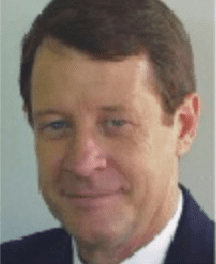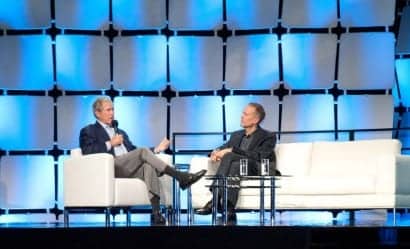
Members of the AAA International Subcommittee gather with friends for a group photo during the International Reception.
During the AudiologyNOW! 2016 Convention held in Phoenix, Ariz, April 13-16, members and friends of the American Academy of Audiology (AAA) International Subcommittee gathered for the International Reception on the Oculus Veranda at the Sheraton Grand Phoenix Hotel. Under a starry night sky, reception attendees gathered together to meet and greet friends from all points on the globe as they sipped wine and tasted sweet treats from an ice cream bar, a chocolate fondue station, and an international pastry buffet of delectable desserts.

Frank Musiek; Linda Hood; Brad Stach, and Jerry Northern at the International Reception in Phoenix, Ariz.
Described by one attendee as a “think tank that facilitates committee communications among international members,” the official purpose of the International Subcommittee of the AAA as explained on the Academy’s website is to increase international membership in the Academy and develop organizational affiliations in order to enhance the development of the audiology profession worldwide through education, support of research, and increased collaboration. Further, this subcommittee is tasked with assessing the Academy’s international membership and advising the Board of international member needs and value added benefits.
International Subcommittee members Jack Scott, PhD, Chair; Sugata Bhattacharjee, AuD, Past Chair; Patricia Castellanos, AuD; Rupal Chaudhary; Nad Kattan, AuD; Todd Ricketts, PhD, Academy Board Liaison; and Sarah Sebastian, CAE, Academy Staff Liaison.
International AuD Student Attends AAA Conference for First Time
One of the many attendees at this lively reception was second-year AuD student Langathani Siziba, originally from Zimbabwe, Africa. Siziba currently resides in Idaho, where she is enrolled in the audiology program at Idaho State University. This was Siziba’s first time attending the AAA convention, and she told The Hearing Review that the International Reception was one of the highlights for her. Other highlights Siziba listed from AudiologyNOW! 2016 were the opportunity to interact with so many students and working professionals who share common interests and goals to expand the field of audiology and improve ways to provide patient care. She particularly enjoyed the “Grand Rounds: Vestibular and Equilibrium” session, as well as the “Tele-Audiology Toolkit” session. Siziba said she was interested to learn how the field of audiology is changing through the provision of tele-audiology, as she believes this approach to care has great potential to improve the ways in which we can communicate with our patients, and remotely provide services to them in a cost-effective manner.
In her engaging and articulate manner, Siziba explained that her Capstone project for her AuD degree program will focus on exploring the use of tele-audiology, and it’s prospects for improving humanitarian audiologists’ provision of follow-up care services in developing countries. In addition to improving humanitarian missions abroad, Siziba is interested in one day providing audiological services in her home country of Zimbabwe. She has discovered that Zimbabwe currently has a shortage of audiologists, with only a handful of hearing care professionals providing hearing care services to the entire country, which has an estimated population of 15, 764, 255 people. Her dream is to one day return to Zimbabwe and establish a non-profit organization that will cater to the hearing healthcare needs of Zimbabweans, and inspire future generations to also pursue careers in audiology.







As a faculty member at Idaho State University, I can tell you that we are very proud of Langathani. Thank you for highlighting her in your article. Langathani is a great student, and we look forward to great things from her in the future!